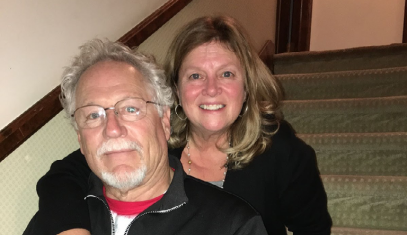Meet Gary
Mesulam Center Research Participant
By Chloe Hilles
When Gary Kratina was first diagnosed with behavioral variant frontotemporal dementia (bvFTD) in 2018, he and his wife, Robin, did not know much about the disease. They are not alone, many don’t understand the complexities of bvFTD. The Kratinas, who are local to Omaha, Nebraska, found the Mesulam Center to be a hub of knowledge for bvFTD.
“We are at the Mesulam Center because it is the center for FTD. The Mesulam Center has specific research in FTD and we feel like our input and involvement is valuable to their work because there is still so much to learn about the disease,” Robin said, who is Gary’s primary caregiver. Robin said she loves the open communication, ample resources, and support from the research assistants at the Mesulam Center.
 Behavioral variant frontotemporal dementia is considered an atypical dementia diagnosis. Individuals with bvFTD frequently have executive function and reasoning deficits. "Reasoning" refers to mental activities that promote decision-making, such as being able to categorize information. "Executive functions" is a term that refers to yet another group of mental activities that organize and plan the flow of behavior.
Behavioral variant frontotemporal dementia is considered an atypical dementia diagnosis. Individuals with bvFTD frequently have executive function and reasoning deficits. "Reasoning" refers to mental activities that promote decision-making, such as being able to categorize information. "Executive functions" is a term that refers to yet another group of mental activities that organize and plan the flow of behavior.
Robin and Gary believe it is critical to continue to do therapeutic activities, such as speech therapy. Even though there currently is no cure for FTD, the Kratinas are determined to sustain Gary’s quality of life.
“We want to do every single therapy possible to keep his brain in the best working condition, for as long as possible,” Robin said.
If Gary and Robin could give others diagnosed with bvFTD advice, it would be, “Never lose your sense of humor.”
The couple has also committed their time and energy into a research study, and Gary has agreed to donate his brain after he passes away. Proudly, Gary keeps his brain donor card in his wallet. He wants his brain to go to the Mesulam Center to help future generations.
Brain donation is a critical part of research because it allows scientists to examine the physical characteristics and the pathology of the disease in the brain. Comparing the information gathered while Gary was alive with what is found in his brain after death, is a key part of better understanding dementia and the disease that causes it.